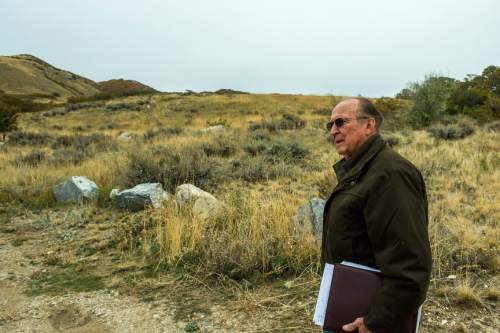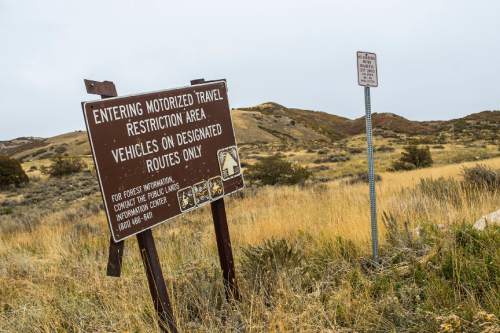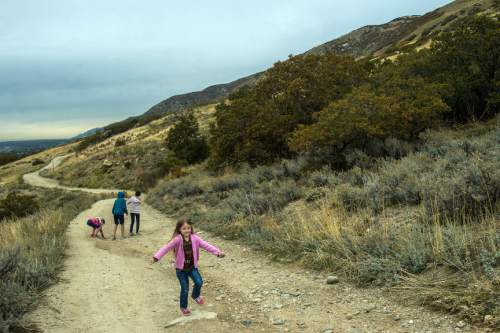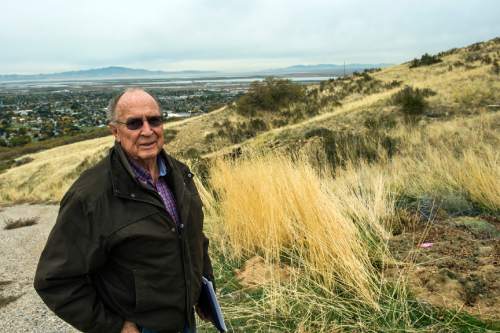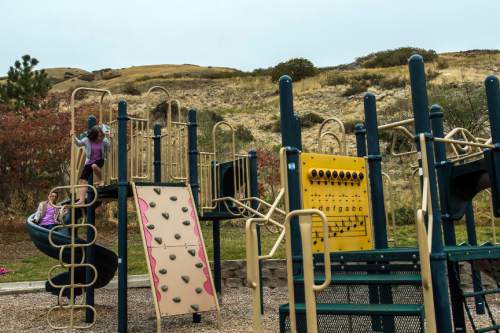This is an archived article that was published on sltrib.com in 2015, and information in the article may be outdated. It is provided only for personal research purposes and may not be reprinted.
A pair of Utah developers are seeking a public land swap in the Bountiful foothills that they say will accommodate public access and conservation in two key spots.
Some residents, however, fear the plan would invite high-density residential growth.
As many as 500 people showed up at Tuesday's Bountiful City Council public hearing on the proposal, which would exchange buildable ridgetop acreage just north of Mueller Park for national forest land below a rifle range operated by the Lions Club.
Dozens spoke against the swap, saying it would pave the way to the construction of up to 160 homes on open land that nearby residents have come to cherish.
Developer Jaren Davis and property owner Ron Crapo, however, say their proposal would lock in access to open land greater than what the public currently enjoys. The are seeking the city's blessing before enlisting the help of Reps. Rob Bishop and Chris Stewart to push the swap through Congress.
The deal would trade 160 acres formerly owned by Ken Patey above Bountiful's Maple Hills subdivision for 154 acres administered by the Uinta-Wasatch-Cache National Forest a few miles north, at the Centerville town line, where a firing range has long been operated under permit with the U.S. Forest Service.
If the City Council chooses to not send a letter of support, Davis said, he will abandon the proposal and develop the land near Mueller Park, a beloved natural area associated with Bountiful's Mill Creek.
Council members did not take a position on the swap Tuesday, and will hold a special meeting on Nov. 17 to decide.
The parcel Crapo and Davis want to trade is high in the foothills, adjacent to undeveloped public lands, and an extension of the Bonneville Shoreline Trail has been proposed to run though it.
But it could just as easily see the kind of high-elevation development that many people would oppose and that would forever lock the public out, according to Davis. The previous owner was fond of cutting trails here, but showed no interest in allowing public access.
"I can envision a wonderful dog park here. This is a gem," said Davis, a Salt Lake City Realtor who has served on the Utah Quality Growth Commission and is now the principal at JLD Development. "If we go up the side with housing, it would be just one more guy farther up the hillside."
Crapo obtained his parcel out of foreclosure and partnered with Davis to figure out what to do with it. They have concluded that it should be preserved for public access, but would like to build on 56 acres on the eastern edge of town in exchange for their land.
The acreage Davis and Crapo want to build on is the lower third of the 160-acre national forest parcel immediately above Twin Hollow Park. The shooting range operates at the uphill end, and the Bonneville Shoreline Trail runs through here too. The developers say they would convey all the land above the trail to the Lions Club, which would be obliged to preserve public access and not develop it.
But some neighboring residents say the plan would be "a disaster for our families and our community," putting dozens of homes on land currently used for hiking and mountain-biking in a natural setting. Residents fear fences and no trespassing signs could go up if the swap happens, according to Twin Hollow resident Earl Thomas.
"All of that ground has been available to take their children to hike it, bow hunt during deer season ... biking trails, ATV trails have been used for years," he said. "We would lose all these rights and we end up with ground where there is no access to it, no roads no water. The speakers [at Tuesday's meeting] were upset with the way the developer went in private without anyone knowing what was going on."
But Davis contends the land swap would accomplish a greater good.
"At the end of the day, the public gains nearly 100 acres in critical open space with new trail systems and amenities. The Forest Service 'squares' off their boundaries, ridding themselves of gun club issues and development intrusions. The gun club maintains existence and Ron is able to develop on property where development is the highest and best use of the land," Davis wrote in a statement to the city.
Still, a successful land swap would place controversial decisions on the Bountiful City Council's plate.
City planning staff cautioned the council that endorsing the swap could create the "perception" that it will OK development of the exchanged land.
"As a practical matter, it will be difficult for the City Council to endorse the land exchange now and then later refuse to approve the actions necessary to implement the development, such as annexation, rezoning, amending the Land Use Ordinance and the use of City property," staff wrote in their report.
Forest Service officials were not prepared to comment on the proposed swap, but getting the private land in public hands and off-loading the gun range could come as a relief to the land-management agency.
The former owner of Crapo parcel, Ken Patey, has a long history of conflict with neighbors, the city and the Forest Service over Patey's practice of cutting trails and roads and removing trees on the hillside near Mueller Park.
In 2003, federal prosecutors charged him with illegally bulldozing motorized recreation trails in the national forest there. Patey pleaded no contest and paid $900 in fines and restitution. Bountiful sued him for bulldozing slopes greater than 30 percent in violation of city ordinances.
Crapo recently obtained the Mueller Park property after Patey defaulted on a $1.6 million debt. The 160 acres, which had been put up as collateral, attracted a high bid of $950,000 at auction last year, according to court records. Crapo is suing to recover the outstanding portion of the debt.
Brian Maffly covers public lands for Salt Lake Tribune. He can be reached at brianmaffly@gmail.com or 801-257-8713.
Twitter @brianmaffly


